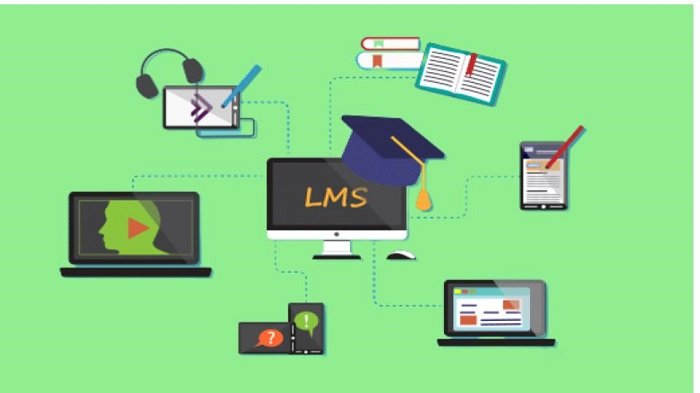Learning Management Systems: A Complete Buyer’s Guide

Learning Management Systems (LMS) are certainly familiar to you, but you may want to learn more about them and how they may benefit your company.
Everything you need to know about LMSs, including what they are, how they operate, and the benefits they provide, is outlined in this LMS buyer’s guide. Let’s get going!
What is a Learning Management System (LMS)?
Educators can design, manage, and deliver instructional content and learning experiences to students using a software program called an LMS. It can be applied to both conventional and online learning settings.
It’s crucial to take your time selecting an LMS that will meet your unique needs due to the sizeable nature of the expenditure.
You would need to reflect on issues like:
Do you require a method that can be applied to both traditional and online learning?
Or is a system tailored specifically for online learning what you require? What qualities matter to you? What alternatives are there for pricing? And so, what should I think about while purchasing an LMS?
The following factors should be taken into account while purchasing an LMS:
What are you hoping to accomplish with the LMS? Training & development, learning management, onboarding new employees, or anything else?
- Your organization’s size: How many staff members will use the LMS?
- Feature requirements: What qualities matter to you? online tests, reporting and analytics software, collaborative tools, etc.?
- Budget: What sort of financial commitment are you making to an LMS?
Vendor standing Before deciding on a vendor, conduct research and read reviews. - Your next concern is the LMS’s deployment after you’ve chosen it with the aid of our LMS buying guide above. You can review the parts below to choose the most effective strategy to implement your LMS because there are numerous ways to do so.
Optional Deployments for Learning Management Systems
You have a few alternatives for deploying your learning management system (LMS), including:
- Cloud-based (SaaS) (SaaS)
- Desktop program hosted independently
- smartphone application
- Cloud-Based (SaaS) (SaaS)
Due to its simplicity in setup and administration, this deployment option is the most popular. All of your data is kept on the provider’s servers while using a cloud-based LMS.
One drawback would be that you would be dependent on the supplier in the event of interruption or data loss.
Self-Hosted
You deploy the program on your servers when you use a self-hosted learning management system. This solution gives you greater control over your data, but it can also be more expensive in the long term and more difficult to set up.
2. Desktop Program
An installed piece of software is referred to as a desktop application. The desktop version takes care of all that, so it’s excellent for enterprises that don’t want to keep track of updates and fixes. This choice, meanwhile, might not be as mobile-friendly.
3. Smartphone application
An LMS that is specifically created for use on mobile devices is known as a mobile application. For businesses who want a mobile-friendly LMS but don’t want to deal with the hassle of setting up a self-hosted or cloud-based LMS, this option is fantastic.
Options For Learning Management System Licensing
The two primary license types for learning management systems are paid and open source.
A) Free Software
With an open source learning management system, you can make any changes you want to the code without paying anything. Additionally, a community of developers usually supports it and works to keep the program up to date.
B) Awarded Licenses
Paid Licenses, on the other hand, typically demand a one-time payment for access to the product plus recurring fees for support.
Additionally, they frequently provide more functionality, customization choices, and technical support than Open Source alternatives.
In general, an open source learning management system is preferable if you don’t require any additional functionality or customisation.
Learning Management System Pricing Models
When choosing a learning management system, cost is another important factor. Understanding the various pricing models is frequently required for this.
The following are three of the most popular pricing schemes for learning management systems:
1. Licensing \Subscription
Perpetual Licensing A one-time payment and an annual maintenance cost are normally needed for perpetual licensing. Because it is frequently expensive up front, this strategy is becoming less popular.
Subscription A subscription involves a recurring monthly or yearly price, as well as potential supplemental charges based on consumption.
If you need to scale quickly and have a consistent budget for the software, this strategy is ideal.
2. Freemium
Freemium provides constrained access to the platform with all essential features available. Before committing to a commercial subscription, organizations can test out a learning management system for free.
3. Perpetual
Last but not least, there is the Perpetual License, which makes sense if you want to use your system for many years and offers access to the program indefinitely.
Types of LMS Specification Support
When it comes to learning management systems, there are four primary categories of specifications. which are
Tin Can API AICC IMS LTI SCORM 2004
The most popular option is SCORM 2004 since it enables firms to include several forms of e-learning content into a single system. Additionally, it provides tracking and reporting functions that make managing learner progress easier.
API Tin
Another well-liked option is the Tin Can API. By enabling users to access data from various sources, this API enhances the interactivity of e-learning materials.
Limited platform access with the most essential functionalities is available through AICC Freemium. Before committing to a commercial subscription, organizations can test out a learning management system for free.
LTI IMS
Finally, IMS LTI is the best option for institutions who want to work with outside parties because it makes it simple to share content between various LMSs.
Which Industries Can Benefit from LMS Systems?
The truth is that practically any organization can profit from learning management systems, if you’re wondering which ones.
An LMS can offer particular benefits to your company whether you run a huge enterprise, a small-to-medium business (SMB), are a freelancer, or fall somewhere in the between.
a. Large Businesses
Established businesses may have several divisions and may have a number of L&D goals to address.
Learning management systems enable businesses to design standardized training programs across several departments and guarantee that all staff members have access to the most recent learning resources.
b. Small and Medium-sized Companies
Since SMBs frequently expect their staff to perform several jobs and responsibilities, they could potentially gain from implementing an LMS.
Access to organized educational resources and training programs is made possible for small business enterprises by learning management systems.
SMBs may better educate their staff about their goods, services, and procedures in this way.
c. Freelancers
LMS is often used by freelancers to communicate online with their clients or pupils. The possibilities are unlimited, from charging for online courses to providing free webinars or digital courses on a particular subject to instructing students virtually through video conferencing.
Why Pay Attention to LMS Integrations?
Depending on the size of your business, you may already use a number of software programs. They should cooperate with your LMS.
Software that connects with your current systems should be on your radar. By decreasing the number of manual processes and double-entry, this can save you time and hassle.
The good news is that a variety of third-party goods and services can be integrated with the majority of contemporary LMSs.
These consist of authoring tools, social media plugins, web conferencing platforms, CRM (customer relationship management) software, accounting software, and more.
Your LMS should interface with other tools to accomplish your learning objectives regardless of the type of business or learning environment you run.
So keep this in mind when looking for an LMS; after all, who wants to deal with the headache of manually moving data across systems?
Which LMS Is The Best For Your Needs? – LMS Buyer’s Guide
You might be wondering which software is suitable for your needs now that you are familiar with learning management systems and their capabilities. That depends on a few things, such the amount of users you intend to support and the kind of material you’ll be delivering, among others.
For instance, if you need an LMS to hold a lot of content or support a lot of users, a hosted solution might be your best bet. On the other hand, a self-hosted solution can be preferable if you want something that is lighter and simpler to use.
If you want to add features unique to your company to your LMS, an open-source solution might be worth looking into. That being said, there is no one software that works for all when it comes to LMS, as the ideal solution depends solely on your requirements.
Key Characteristics of Learning Management Systems
There are a few essential elements that you should look for while looking for the best learning management system.
- Options for Flexible Course Creation & Delivery: The platform should enable you to design and administer courses in a variety of forms, including instructor-led sessions and self-paced lessons. Additionally, you need software that works with all platforms, browsers, and operating systems.
- Automated Reports & Analytics: The finest platforms produce reports on user involvement that are generated automatically, which can help you monitor student development. Additionally, ensure you have access to robust analytics tools that provide you with information on how readers react to your material.
- Finding a platform that is simple to link with other systems, such as customer relationship management (CRM) or enterprise resource planning, is crucial (ERP). This will assist in streamlining operations for all of your systems.
- The ideal learning management system is one that both satisfies your organization’s needs and your financial constraints.
- What Are The Advantages Of Using The Appropriate LMS For Your Company?
You are aware of the numerous advantages of choosing the best learning management system for your company. What are they, though?
Organize & Safely Store Your Data
With the aid of a decent LMS, you can manage all the relevant data on your staff and students in a single, organized location.
In this approach, you may evaluate trends, developments, and results fast. To maintain data security, it also provides you with a general overview of the complete system.
Track learner development and performance.
Monitoring learner performance and progress is made simpler by an LMS. Remember that keeping track of your progress is essential to studying, and using these tools simplifies the process considerably.
Individualize the Learning Process
Every student has unique needs, and it is your primary responsibility to meet them—something that is challenging to do in a conventional learning setting.
However, LMSs let you tailor the educational experience; you may make unique content to meet the needs of various students.
Increase Accessibility to Learning
Finally, a large audience must be attracted in order to create a successful online course. Any device type or geographic location may easily access the best learning management system.
Conclusion
The ideal LMS for your company will ultimately depend on your unique requirements. Before choosing the best option, conduct research, speak with experts, and test out a few various solutions.






